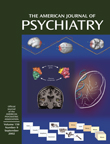Paternal Age and Schizophrenia: Further Support for an Association
Abstract
OBJECTIVE: Advanced paternal age has been proposed as a risk factor for later development of schizophrenia in offspring, although studies are not conclusive. De novo mutations arising in paternal germ cells have been suggested as the underlying mechanism. METHOD: The hypothesized association was investigated in a population-based case-control study comprising 524 subjects with schizophrenia and 1,043 matched comparison subjects selected from registers. Birth records with data on parental age were retrieved manually. Odds ratios were computed, with controls for maternal age, parity, marital status, socioeconomic status, maternal psychotic illness, and obstetric complications. RESULTS: The odds of schizophrenia in offspring of fathers 45 years old or older were 2.8 times as great as in offspring of fathers aged 20–24 years. CONCLUSIONS: These findings confirm previous reports of a higher risk for schizophrenia associated with advanced paternal age. They may be of interest for further studies on the genetic mechanisms behind schizophrenia.



